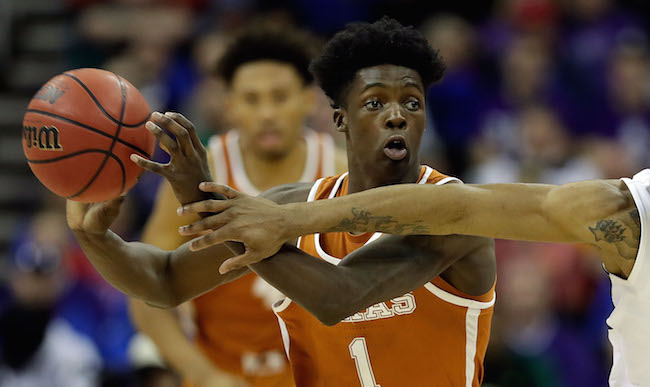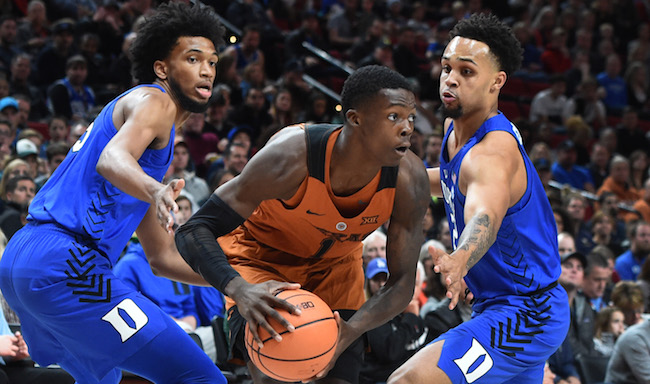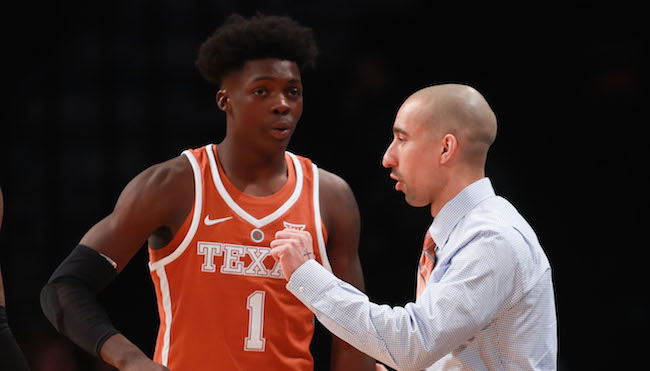
University of Texas guard Andrew Jones hadn’t sat out a game for as long as he can remember. Jones had a promising freshman season, finishing tied for the team lead in assists, second in steals, and produced double-digit scoring performances in 22 of his 33 appearances, coming on especially strong in the second half of the season.
Entering his sophomore season, he was set to be a key cog in Shaka Smart’s Texas team, but just weeks into his second year in Austin, everything changed. After a game against Iowa State, Jones began to feel different.
“I can just remember being tired at a few practices, not being able to compete like I used to,” Jones told Dime. “It was like I wasn’t my normal self.”
He felt sick and the coaching staff took notice, encouraging Jones to get checked out and expecting him to learn he had the flu or some other ailment. After having tests run to determine what was wrong, doctors determined he had leukemia. A cancer of the bodies blood-forming tissues, leukemia is a form of cancer that has a five-year survival rate of 57 percent.
After the initial appointment and diagnosis, Jones had plenty of questions. Where the cancer came from? Why it happened? Would he live or die? Would he play basketball again? The answers were less than concrete and a treatment plan of two years was put in place. His basketball career was to be put on hold for at least that long.
“I was shocked,” Jones says. “I was just feeling like I was getting to the top of my game and on a great team. Then it felt like I had to start over. It was all taken away.”
Jones changed hospitals and was, at times, so drained that he felt couldn’t move, get out of bed or walk around. Treatments including x-rays, chemotherapy bag changes and blood work would typically last all day. In those times, basketball and family were the two things that kept him going.
“At first, it was hard,” Jones says after being admitted for treatments. “But, you grow to appreciate even the simplest of things like changing your clothes.
“My biggest motivator was being back on the basketball court,” Jones continues. “Knowing that I could be back on the court, I used that as my motivation. My aspirations to be back on the court and playing is the main reason for why I was in a good space in the hospital and now. Without that, I don’t think I’d be here or it would’ve been much harder.”

Jones spent months in the hospital, watching his team play and support him. While all the support was coming in, Jones felt that love and appreciation and it made him miss playing even more. As he went through daily treatments, he would sometimes struggle to get out of bed or even walk, but that motivation of getting back on the court kept him going.
He’d watch more game tape, film, highlights and basketball than he’d ever seen before. It was almost as if he’d turned into a coach or scout. Basketball was there getting him through the tough times, reminding him of what he was missing. In response, Jones used the forced time off the court to prepare himself to get back on it.
“I’ve always watched film, but I watched more than I ever have,” Jones says. “You see everything differently. I had a different outlook on how people score and their movements, plays, everything.”
Jones was released from the hospital in February and he needs a few final tests before being cleared to play in what will be his junior season. Jones is already working out as much as he can and is back on the basketball court already, putting in work in pickup games so he can shake off the rust off his physical game and combine it with his sharpened basketball IQ.
He is attempting a comeback almost a year sooner than what doctors anticipated. If all goes right, Jones will get the chance to show off the fact that he’s spent more time than he ever has before studying the game of basketball and those who play it, giving him a leg up on whomever he’ll face on any given night.

Jones had declared for the 2017 NBA Draft before removing himself from consideration and coming back to Texas for his sophomore campaign. His life has obviously changed in the year since, but the goal remains the same: Make it to the NBA and be a star.
”I try and watch guys like Damian Lillard and Terry Rozier,” Jones says. “I think I play similarly to those guys, so I try and see what they do. If and when I end up in the NBA, I’m going to play whatever role I’m given. But, I think with the way I’m play, I’m built for that star role, I’m not just a role player.”
When he returns for his junior season at Texas, he’ll have endured a battle that few have seen or felt. His fight against cancer has changed his perspective and he feels he’s going to make an immediate impact.
“I’m coming back with a mindset that many don’t have,” Jones says. “I’m coming back knowing that every day on this earth is a blessing and you can never take anything for granted. When I step on the court, that’s how I’ll play, more than I’ve ever been before. I’m more motivated than ever.”
If Jones can return to the form he showed early in his sophomore season, in which he flashed an improved jumper, he’ll be a problem on the court thanks to his newfound approach to the game. He’s increased his mental aptitude for basketball, which will make him a smarter, savvier player on the court to go with his natural gifts and talents.
While Jones hasn’t fully been cleared for playing in the upcoming season, the prospect of him not only playing, but getting a different perspective on the game has likely helped, not hurt him, as a player and as a person. This unfortunate, stressful, and painful experience has changed the way he views and plays the game of basketball forever. He’s smarter and stronger now, and can’t wait to finally show that on the court soon.






